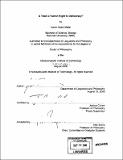Is there a human right to democracy?
Author(s)
Abdul-Matin, Karim (Ishmawil Karim)
DownloadFull printable version (5.084Mb)
Other Contributors
Massachusetts Institute of Technology. Dept. of Linguistics and Philosophy.
Advisor
Joshua Cohen.
Terms of use
Metadata
Show full item recordAbstract
My dissertation asks whether there is a human right to democracy. This is a difficult question, not least because there is no consensus about either what democracy requires or how to interpret human rights. The introduction aims to alleviate these sources of confusion about the question itself, in addition to presenting the main arguments in favor of a human right to democracy, and my rationale to focus more narrowly on a question of toleration. The main discussions are organized around the idea that if democratic peoples should tolerate undemocratic peoples, then a human right to democracy does not exist. Part 1 uses discussions about corporate agency and the conditions of corporate responsibility to argue that a group's capacity for responsible collective agency depends on four things: its ability to form collective intentions, an internal culture that orients the formation of personal intentions to act in accordance with those collective intentions, agents authorized to act (vicariously) for the group, and an effective internal practice of public accountability. I also suggest reasons why it is sometimes appropriate for a collective entity to authorize the agents acting on its behalf to use coercion. (cont.) Part 2 uses these ideas of responsible collective agency and the grounds of legitimate coercion to interpret Rawls's idea of a people as a normative conception of collective self-determination. I explain why a people (in Rawls's sense) meets the four conditions of responsible collective agency, why democracy is not necessarily required for collective self-determination, and also why a people's government should possess coercive authority. Part 3 addresses directly whether democratic peoples should tolerate undemocratic peoples. Traditionally, theorizing about toleration tends to focus on the domestic relations of a given society, and is thus not clearly relevant to questions of toleration among peoples. Therefore, the bulk of Part 3 is devoted to developing an idea of international toleration. Based on this idea of international toleration, and the value of the self-determination of peoples, I argue that democratic peoples should tolerate undemocratic peoples. I conclude that a human right to democracy does not exist.
Description
Thesis (Ph. D.)--Massachusetts Institute of Technology, Dept. of Linguistics and Philosophy, September 2006. "August 2006." Includes bibliographical references (leaves 79-80).
Date issued
2006Department
Massachusetts Institute of Technology. Department of Linguistics and PhilosophyPublisher
Massachusetts Institute of Technology
Keywords
Linguistics and Philosophy.